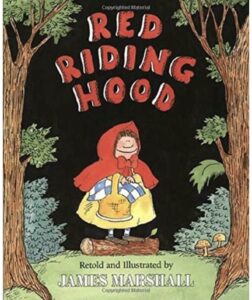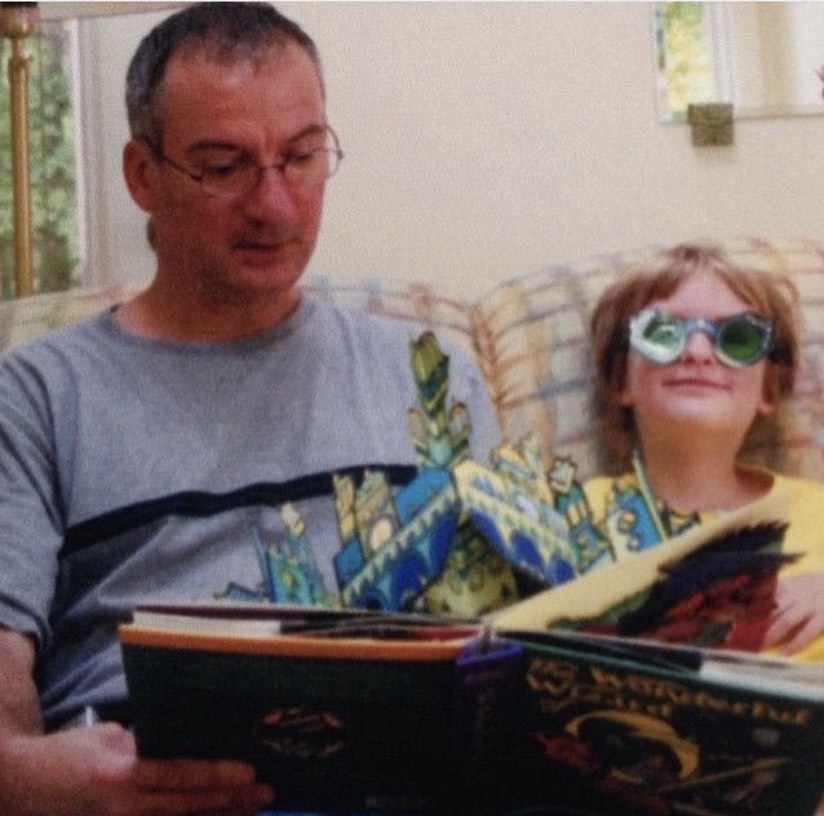From the moment I could open my eyes and recognize words and pictures, I had a book in my hands. The first book I ever held was a cardboard copy of Margaret Wise Brown’s Goodnight Moon, which was given to me by my parents. The cardboard copy was necessary as I tended to turn the pages of books excitedly, and my parents feared I would rip paper books to shreds.

To read, or be read to, was of the utmost importance to my family, so my father read to me every night for the first six years of my life. I often remember the wonder I felt as my dad read through James Marshall’s Hansel and Gretel and Little Red Riding Hood. The images and stories of those picture books are etched into my mind, as is the soothing tone of my father’s voice and my sleepy voice begging him to read “just one more book!”
Our relationship was founded on picture books and, later, chapter books. Each night, I collected a stack of books for him to read to me. Some nights it was Hansel and Gretel. Other nights it was Barbara Cooney’s Miss Rumphius. I ended each day by escaping into a fantasy world where I bested wicked witches and hungry wolves or settled down in a cottage by the sea. To have these worlds narrated to me by my father made them even more precious than they already were.
I did not take story time lightly. It was a time of reflection, relaxation, and learning. I went to bed each night with a new life lesson to consider.
My father would often pause when reading and gently impart life lessons to me. “Now remember, Nora, Little Red strayed from the path, and that’s where she met the Big Bad Wolf. If you don’t leave the path, you won’t have to worry about bad things happening to you.”
I never strayed from the path but found myself in upsetting situations. Like Little Red Riding Hood, I was confronted by the Big Bad Wolf many times throughout my life in different shapes and sizes. Even though I kept straight and narrow, why did I encounter wicked witches or hungry wolves?
There is no real answer to that question. But, there is a solution, which came from a quote my father often told me whenever I was upset: “This too shall pass.” Four words and one simple message. The pain will pass. It is not forever. You will survive this. How versatile and vital that phrase is. You can apply it to anything! You fell and scraped your knee? “This too shall pass.” Your car broke down, and you can’t get to class? “This too shall pass.” Your company had a mass layoff, and you lost your job? “This too shall pass.” The man who read to you every night until you were six died suddenly? “This too shall pass.”
Who or what do we turn to when we are confronted with tragedy? If we seek out our friends, they may offer comforting words. If you are like me and stick your nose in a book, you may find an escape from your troubles. Whatever form of comfort you choose, the root of it all is language. Your friends and family will listen to your woes and give you comfort and advice. Your favorite book may do the same for you as your loved ones. Stories are a place where we can find both ourselves and comfort. They are an escape from the bleak world we traverse through. They offer guidance and friendship. We may relate to a character like Little Red Riding Hood, Hansel, or Gretel. When we see ourselves in fictional characters and see how they overcome challenges, it is easier for us to overcome our own.
Stories and storytelling are essential to our well-being. When your parents read a picture book to you, you first encounter language. You listen to them as they read and occasionally stop them and ask, “what does that word mean?”
Next, you experience life lessons. You will again stop them midsentence and inquire, “Why did Little Red leave the path? Why didn’t she turn back when she met the wolf?” Your parents may answer, “she didn’t listen to her parents, that’s why!” You promptly respond, “Well, I won’t make that mistake!”
As your parents read on, you occasionally stop and offer commentary. Maybe you say, “I feel bad for Little Red. I’m sure she was scared when she was in the wolf’s belly.” And so, you learn new words and lessons in a single night from a single book. Now multiply what you learned from that night by 2,190, and what do you get? Six years of knowledge, wisdom, and empathy.
We are given these vital gifts from the books we read and the stories we are told. We can apply the lessons learned from stories like Little Red Riding Hood to our own lives. We can remember how we felt scared for Little Red and how wished we could have helped, and we can apply those feelings to our personal relationships. A single story can help mold us into someone who can empathize and understand.
Little Red Riding Hood is not the only story out there; there are countless others with countless lessons and gifts. Each book we read offers a new perspective on life; how to navigate difficult situations, how to comfort a friend, or how to believe in yourself. Stories make us better friends, daughters, sons, husbands, wives. They help us see the world differently and beg us to stop and ask ourselves, “What would Little Red do? What should I do?” Whatever your answer, you just might find it in a book.

